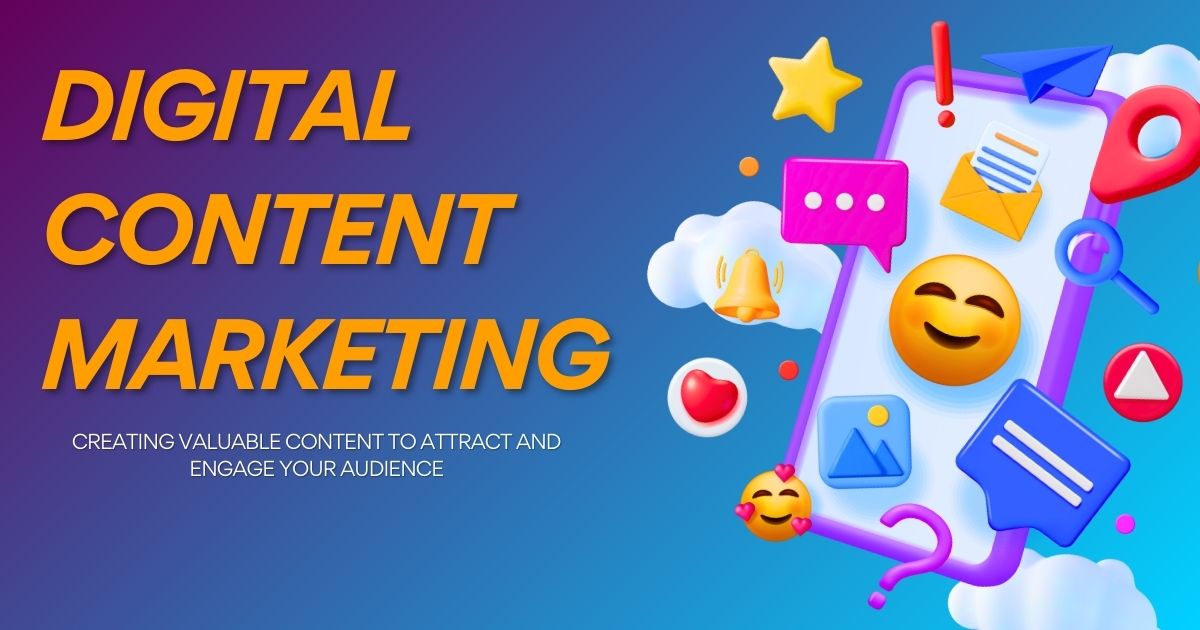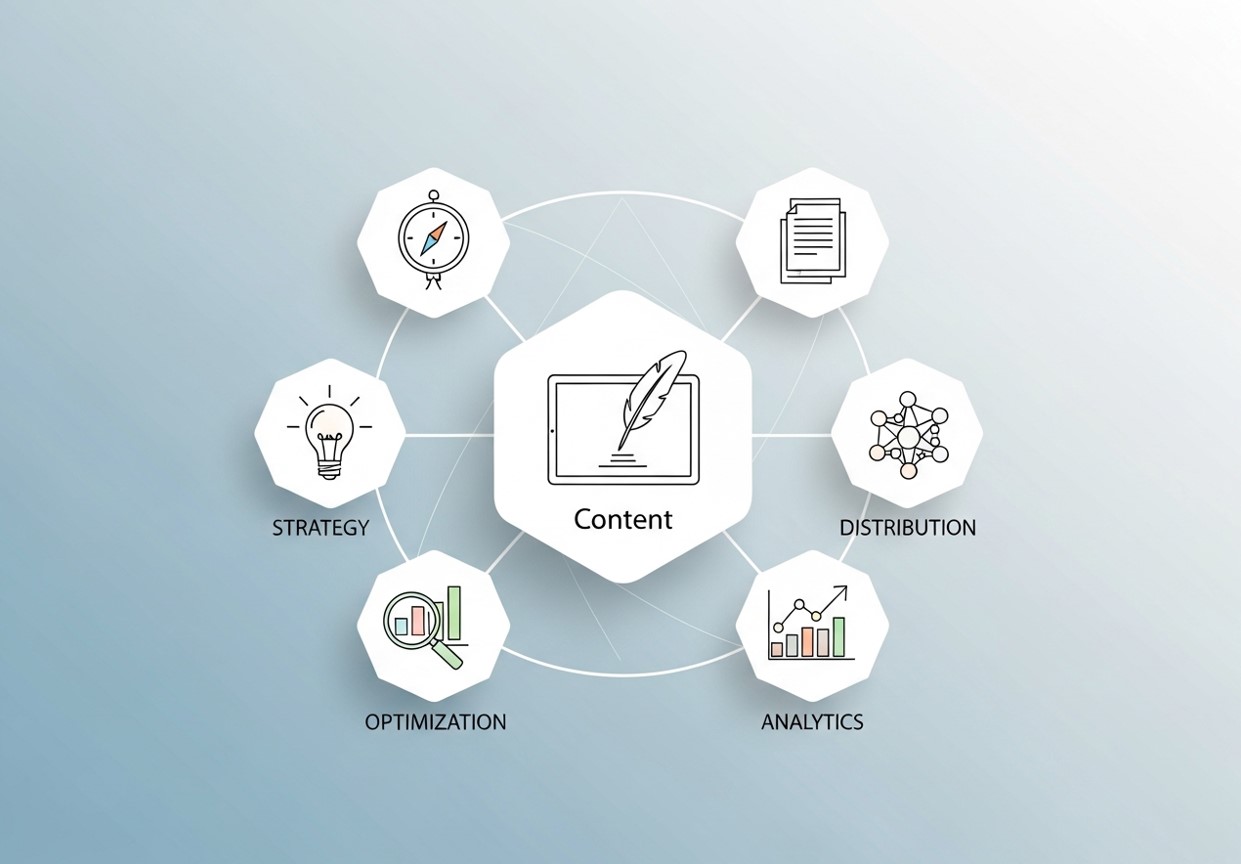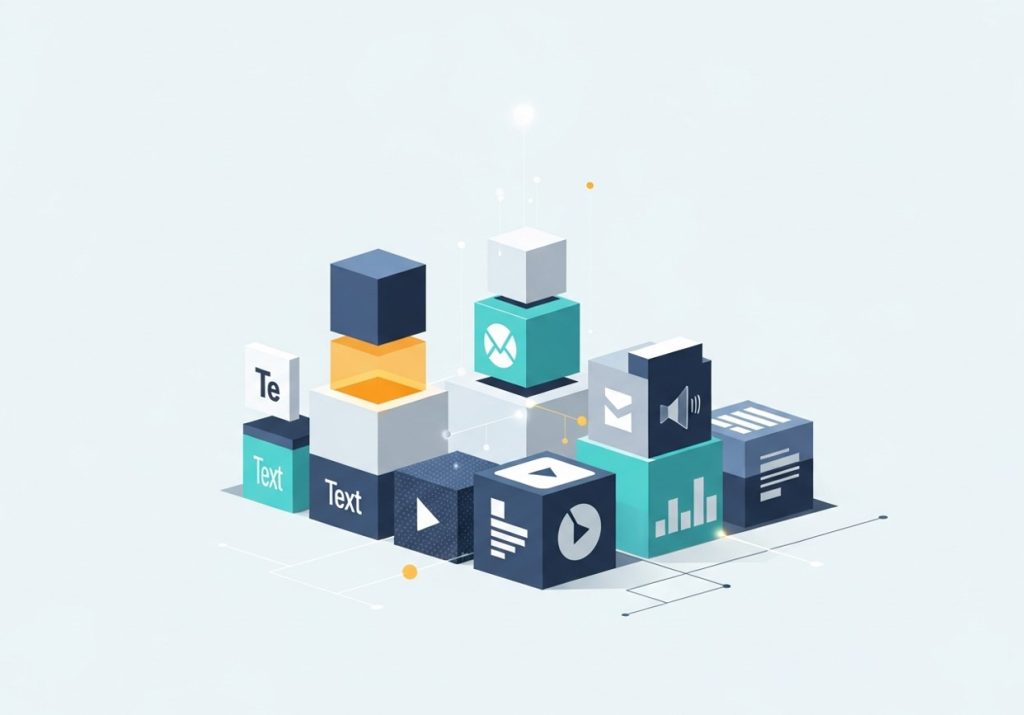
Digital content marketing focuses on creating valuable, relevant content to attract and engage the right audience. This guide explains how to plan, create, distribute, and measure content effectively using SEO, audience insights, and consistent optimization to drive long-term business growth.
What is Digital Content Marketing?
Digital content marketing is the strategic creation and distribution of valuable, relevant content designed to attract and engage a clearly defined audience. Unlike traditional advertising, which interrupts people with promotional messages, content marketing provides genuine value that audiences actively seek out.
The digital aspect encompasses all online channels where content lives—websites, social media platforms, email inboxes, search engines, and mobile apps. This multichannel approach allows brands to meet their audience wherever they spend time online.
Successful digital content marketing serves three core purposes: it educates potential customers about problems and solutions, builds trust and authority in your industry, and guides prospects through the buyer’s journey from awareness to purchase.
Core Components of Effective Digital Content Marketing

Content Strategy and Planning
A solid content strategy forms the foundation of successful digital content marketing. Start by defining clear objectives that align with your business goals. Are you looking to increase brand awareness, generate leads, or nurture existing customers? Your goals will shape every content decision you make. For a step-by-step approach, check out the complete digital marketing strategy.
Audience research comes next. Create detailed buyer personas that go beyond demographics to include pain points, preferences, and content consumption habits. Understanding how your audience thinks and behaves online helps you create content that truly resonates.
Content planning involves mapping topics to different stages of the buyer’s journey. Awareness-stage content might include industry trend reports or educational blog posts. Consideration-stage content could feature comparison guides or case studies. Decision-stage content often includes demos, free trials, or detailed product information.
Content Creation and Formats
Digital content marketing thrives on variety. Blog posts remain a cornerstone format, offering flexibility to cover topics in depth while supporting SEO efforts. Video content continues to grow in importance, with platforms like YouTube serving as the world’s second-largest search engine. To maximize SEO, consider following a SEO guide for digital marketing.
Infographics excel at making complex information digestible and shareable. Podcasts create intimate connections with audiences during commutes or workouts. Interactive content like quizzes, calculators, and assessments generates engagement while collecting valuable audience data.
The key lies in matching content formats to your audience’s preferences and consumption patterns. B2B audiences might prefer detailed whitepapers and webinars, while B2C audiences gravitate toward visual content and short-form videos.
Distribution and Promotion
Creating great content is only half the battle—effective distribution ensures it reaches your intended audience. Owned media channels like your website, blog, and email list give you complete control over messaging and timing.
Social media platforms serve as earned media opportunities where content can gain organic reach through shares, comments, and engagement. Each platform has unique characteristics: LinkedIn excels for professional content, Instagram favors visual storytelling, and Twitter enables real-time conversations.
Paid promotion amplifies your content’s reach beyond organic limitations. Social media advertising, Google Ads, and influencer partnerships can expose your content to new audiences who match your target demographics.
Building Your Digital Content Marketing Strategy

Setting Goals and KPIs
Effective digital content marketing starts with clear, measurable objectives. Align your content goals with broader business objectives to ensure your efforts contribute meaningfully to company success.
Common content marketing goals include increasing website traffic, generating qualified leads, improving brand awareness, nurturing customer relationships, and establishing thought leadership. Each goal requires different content approaches and measurement strategies.
Key performance indicators (KPIs) should be specific, measurable, and tied to business outcomes. Traffic metrics like page views and unique visitors show content reach. Engagement metrics including time on page, comments, and social shares indicate content quality. Conversion metrics such as email signups, demo requests, and sales directly tie content to business results.
Audience Research and Personas
Deep audience understanding drives successful digital content marketing. Go beyond basic demographics to uncover psychographic insights about motivations, challenges, and aspirations.
Conduct surveys, interviews, and focus groups with existing customers to understand their journey from initial awareness to final purchase. What questions did they have at each stage? Which content formats did they find most helpful? What concerns nearly prevented them from buying?
Social listening tools reveal how your audience discusses industry topics, competitors, and challenges online. This real-time insight helps identify trending topics and content opportunities while revealing the language your audience uses naturally.
Content Planning and Editorial Calendars
Strategic content planning ensures consistent publishing while maintaining quality standards. Editorial calendars provide structure and accountability for content creation teams while allowing flexibility for timely topics and opportunities.
Plan content themes around seasonal trends, industry events, and product launches. Balance educational content that builds trust with promotional content that drives conversions. The 80/20 rule suggests 80% of content should provide value without directly selling, while 20% can be promotional.
Content batching improves efficiency by grouping similar tasks together. Dedicate specific days to content creation, editing, and promotion rather than switching between tasks constantly.
Content Creation Best Practices
Research and Ideation
A successful digital content strategy starts with consistent research and ideation. Without relevant topic ideas, content can feel scattered and fail to engage your audience. Research ensures your content addresses real needs, answers pressing questions, and positions your brand as an authority.
Keyword Research: Tools like Google Keyword Planner, Ahrefs, SEMrush, and Ubersuggest help identify what your audience searches for and uncover long-tail keywords that indicate high intent, such as “digital marketing strategies for small businesses.”
Customer Insights: Internal teams provide invaluable input. Customer service knows common questions and issues, while sales understands objections and triggers. Using these insights helps create content that addresses real-world concerns and nurtures leads.
Competitor Analysis: Analyzing competitors reveals content gaps and opportunities. Identify topics they cover, formats they use, and areas where they fall short. Tools like BuzzSumo show which content gets the most engagement, helping you create more valuable resources.
Trend Research: Track emerging topics via Google Trends, Reddit, Quora, or social listening tools. Covering trending topics early captures timely traffic and positions your brand as relevant and forward-thinking.
Writing and Design Principles
How your content is written and presented determines whether readers stay or leave. Clarity, readability, and visual appeal are essential for engagement.
Scannable, Conversational Writing: Break text into short paragraphs, bullet points, and subheadings. Write conversationally while keeping a professional tone and avoiding unnecessary jargon.
Storytelling and Value: Use stories, examples, or case studies to illustrate points and provide actionable insights that build trust and authority.
Visual Elements: Include relevant images, charts, or infographics to enhance understanding and retention. Optimize visuals for fast loading and mobile display.
Headlines and Formatting: Craft clear, curiosity-driven headlines and use subheadings (H2, H3) to guide readers, improve SEO, and make content easy to skim. A/B test headlines for best results.
Call-to-Action Placement: Place CTAs strategically—after insights, at section ends, or as sticky banners—to guide readers toward engagement without disrupting their experience.
SEO Optimization
Even the best content will fail to reach its audience if it isn’t discoverable. SEO ensures your content appears in search results for relevant queries, bringing qualified traffic that’s likely to engage and convert.
Keyword Integration: Conduct thorough keyword research to uncover not only primary target terms but also secondary keywords and semantic variations. Integrate these naturally throughout titles, headings, meta descriptions, alt text, and body content. Avoid keyword stuffing, which can harm readability and search engine rankings.
Featured Snippet Optimization: Many searches now return featured snippets—short answers displayed at the top of search results. Structure your content to answer common questions concisely, using numbered lists, bullet points, and clear definitions. For example, start sections with “What is…” or “How to…” to target snippet opportunities.
Technical SEO: Beyond content, technical SEO ensures that your site is crawlable, indexable, and fast-loading. Optimize page speed, ensure mobile responsiveness, implement proper meta tags, and use schema markup to help search engines understand your content context. Regular audits help identify broken links, duplicate content, or crawl errors that could prevent optimal performance.
Internal and External Linking: Internal links guide users to related content, keeping them on your site longer and helping search engines understand your site structure. External links to authoritative sources improve credibility and signal relevance. Both link types are essential for a balanced SEO strategy.
Content Auditing and Updating: SEO isn’t a one-time task. Regularly audit your content to ensure keywords remain relevant, statistics are up-to-date, and content aligns with current best practices. Updating old content can dramatically improve rankings and user engagement.
Measuring and Analyzing Results

Analytics Tools and Metrics
Google Analytics provides comprehensive insights into content performance, audience behavior, and conversion paths. Set up goals and conversion tracking to understand how content contributes to business objectives. Learn more about digital marketing analytics for smarter campaigns.
Social media analytics reveal which content resonates most with your audience across different platforms. Track engagement rates, click-through rates, and audience growth to optimize your social content strategy.
Email marketing platforms offer detailed metrics about content performance in newsletter campaigns. Monitor open rates, click-through rates, and unsubscribe rates to refine your email content approach.
Performance Optimization
Regular content audits identify top-performing pieces and opportunities for improvement. Update outdated information, refresh statistics, and optimize underperforming content for better results.
A/B testing different elements helps optimize content performance over time. Test headlines, images, calls-to-action, and content formats to understand what drives the best results for your specific audience.
Repurposing successful content extends its lifespan and reaches new audiences. Transform blog posts into videos, create infographics from research data, or develop email series from comprehensive guides.
Future Trends in Digital Content Marketing

Artificial intelligence is reshaping content creation and personalization capabilities. AI tools can help with ideation, writing assistance, and content optimization while enabling hyper-personalized experiences at scale.
Voice search optimization is becoming increasingly important as smart speakers and voice assistants gain adoption. Optimize content for conversational queries and long-tail keywords that match natural speech patterns.
Interactive content continues growing in popularity as audiences seek engaging experiences beyond passive consumption. Consider incorporating polls, quizzes, calculators, and interactive videos into your content mix.
Taking Your Digital Content Marketing to the Next Level
Digital content marketing success requires commitment, consistency, and continuous optimization. Start by establishing clear goals and understanding your audience deeply. Create valuable content that addresses real needs while distributing it strategically across appropriate channels.
Remember that building an audience and seeing significant results takes time. Focus on providing genuine value rather than quick wins, and measure your progress against meaningful business objectives.
Begin by auditing your current content marketing efforts. Identify gaps in your strategy, content calendar, or measurement approach. Then, implement one new strategy or tactic at a time to avoid overwhelming your team while building sustainable momentum.
The businesses that succeed with digital content marketing view it as a long-term investment in customer relationships rather than a quick marketing tactic. Embrace this mindset, and you’ll build a content engine that drives sustainable growth for years to come.
Frequently Asked Questions (FAQ)
How often should I publish digital content?
Consistency is more important than frequency. Publishing high-quality, relevant content regularly—whether weekly, bi-weekly, or monthly—helps maintain audience engagement and supports SEO goals.
How do I know if my content is resonating with my audience?
Use engagement metrics like time on page, social shares, comments, and click-through rates. Surveys and feedback forms can provide qualitative insights into what your audience finds valuable.
Should I focus more on SEO or audience engagement in content marketing?
Both are critical. SEO ensures your content reaches the right audience, while engagement determines whether visitors find it valuable and take action. Integrating the two maximizes results.
Can small businesses benefit from digital content marketing?
Absolutely. Small businesses can leverage content marketing to build brand awareness, compete with larger companies, and establish authority in niche markets without a massive advertising budget.
What types of content drive the most conversions?
Decision-stage content such as case studies, product demos, webinars, and detailed guides typically drives the highest conversions because it addresses immediate purchase or action needs.
How long does it take to see results from digital content marketing?
Results vary by industry, competition, and content quality. Organic traffic and engagement improvements can appear within a few months, while significant revenue impact may take six to twelve months or longer. Patience and consistent effort are key.
How can I repurpose existing content?
Transform blog posts into videos, podcasts, infographics, or social media snippets. Update outdated information to improve SEO and relevance. Repurposing extends content lifespan and maximizes its ROI.


Leave a Reply